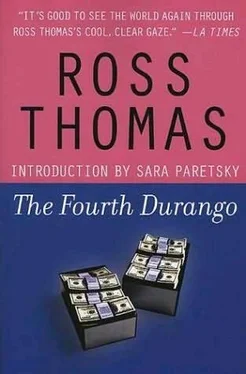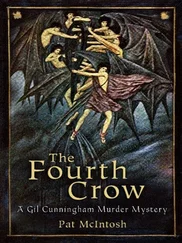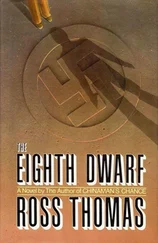Seated in the chocolate-brown leather chair in her living room, B. D. Huckins put down the glass of wine so she could go through the ten index cards Sid Fork had handed her.
“How am I supposed to know which one Frank Riggins picked?” she said.
“You’ll know,” Fork said, drank some of his beer and watched as the mayor glanced at seven of the index cards without expression. She stopped at the eighth, narrowed her eyes and clamped her lips into the thin grim line that helped form her pothole complaint look. Her expression remained grim when she looked up from the photograph and said, “It can’t be.”
“You know better’n that, B. D.”
She tapped the man’s face on the index card with a forefinger. “Where’d you get a picture of Teddy?”
“Remember the day we all moved into that shack he’d rented out on Boatright?”
The mayor nodded reluctantly, as if she found the memory disturbing.
“And the landlord, old man Nevers, came by to see if he could bum a drink and Teddy lined all four of us up-you, me, him and Dixie-and made Nevers take our picture with your Instamatic before he’d give him a drink?”
“I don’t remember any of that,” she said.
“Well, I do. And I also remember getting jumbo prints made of that roll and pasting them in my album.”
“I don’t understand why.”
“Why what?”
“Why you’d even think of Teddy or show his picture to Frank Riggins.” She grimaced, as if at some bad taste. “Teddy. Jesus.”
“What’d I use to call him?”
“Teddy? Snout.”
“And if I didn’t call him Snout, I called him Porky. So this morning, those two ace homicide detectives of mine came up with an eyewitness-Father Frank-who claimed he saw some real short guy of around forty who looked like Porky Pig go into the Blue Eagle and come out just about the time poor old Norm got shot. So I started thinking about whether I knew any short mean guys with piggy noses who might go around shooting people for money or just for the hell of it and I came up with Teddy. I mean, he just popped into my mind.”
“After twenty years?” she said.
“Teddy sort of sticks in the mind-even after twenty years.”
The mayor closed her eyes and leaned back in the leather easy chair. “We should’ve drowned him.” When she spoke again several seconds later her eyes were still closed and her voice sounded weary. “Was Teddy dressed up like a priest?”
“I just told you that.”
“No, you didn’t.”
Fork replayed the last few minutes of conversation in his mind. “You’re right. I didn’t. So who did?”
“Kelly Vines-indirectly.”
“When?”
“Today. Out at Cousin Mary’s.”
“Let’s hear it,” Fork said. “All of it.”
Huckins’s account of the lunch was condensed yet comprehensive and included Kelly Vines’s recollection of his conversation with the doorman who was reluctant to ask a priest for identification. When she had finished, Sid Fork’s first question was, “What’d you all have for lunch?”
“Trout,” Huckins said and quickly recited the rest of the menu, knowing Fork would ask if she didn’t.
“How was it-the trout?”
“Very good.”
“Who paid?”
“Vines, I think.”
“Tell me again what Vines said the doorman said about the short guy in the priest suit.”
“You mean what he looked like?”
Fork nodded impatiently.
“Let me think.” Huckins closed her eyes again, kept them closed for at least ten seconds, opened them and said, “The doorman told Vines the priest was short and mud-ugly and had one nostril twice as big as the other one. He said the nose turned up and aimed what he called the two holes right at you.”
“And that didn’t make you think of Teddy right off?”
“No.”
The nod that Fork had intended to be sympathetic was betrayed by its condescension. “Well, you’re not a cop.”
“But since you are, tell me this. What’ll the cops do about Teddy?”
“Whatever’s within the law.”
“And Sid Fork? What’ll he do?”
“Whatever’s necessary.”
The fifty-one-year-old Durango detective, who had once worked bunco and fraud inDallas, looked up from his copy of People magazine when the tall elderly white-haired man with the neat tar-black mustache strode into the lobby of the Holiday Inn and headed for the shallow alcove where the house phones were.
Marking his place in People by turning down a page corner, Ivy Settles placed the magazine on the table next to the couch and rose, not taking his eyes off the man who stood, pine-tree straight, the phone to his ear, waiting for his call to be answered.
Settles studied the man’s muted brown plaid jacket, deciding it was a silk and wool blend that had cost at least $650-maybe even $700. The deeply pleated fawn gabardine slacks, he guessed, would go for $400, even $425. And those two-tone brown and white lace-up shoes with the moccasin toes-a style Settles hadn’t seen in twenty years-were probably handmade and cost as much as the jacket. Including socks, shirt and underwear, Settles figured the man was wearing close to a couple of thousand dollars on his back and feet.
The detective stuck his hands down into the slash pockets of the Taiwanese-made windbreaker he had paid $16.83 for, including tax, at Figgs’ department store and crossed the lobby on feet shod in penny loafers from Lands’ End. The rest of him was clad in chinos by Sears, a white short-sleeved shirt by Arrow and underwear by Fruit of the Loom. Settles liked cheap clothes and guessed that everything he wore, including his white drugstore socks, hadn’t cost as much as the black lizard strap that bound the thin gold watch to the white-haired man’s left wrist.
With his hands still stuck down into the windbreaker’s pockets, Settles stopped just behind the man, as if the pair of them were forming a line. The man was now talking into a house phone in a crisp and pleasant voice that sounded far too young for his age. Settles thought of it as the man’s up-North voice and remembered how easily it could slide into soft southern tones that sounded remarkably like Charleston.
“Yes, in the lobby,” the man said into the phone. “I thought I might pop up for a minute or two with something that should interest you.”
Finally sensing someone behind him, the man turned to face Settles, who stood, hands still inside the slash pockets, rocking back and forth on his heels. The man frowned and pointed to the other house phones. Settles smiled slightly, shaking his head.
The man turned his back on the detective and again spoke into the phone. “Let’s make that five minutes instead of right away. I have another call to make.”
The man hung up, turned to face Settles again and said, “You queer for this particular phone, friend?”
“It’s been a while, Soldier,” Settles said.
The man frowned again, this time trying to look puzzled. He might have succeeded were it not for the glittering green eyes that could never quite conceal their slyness. “Don’t believe I’ve had the pleasure,” he said in the nicely chilled up-North voice.
“Dallas,” Ivy Settles said. “February of ’seventy-three. I took you down and put you on the Greyhound to Houston after the stockbroker’s widow refused to press charges.”
“My fiancée,” the man said. “Edwina Wickersham.”
“Who you gave the money back to.”
“Repaid the loan, you mean.” The white-haired man studied Settles carefully, taking his time, starting with the penny loafers and working his way up to the round face, where a delicate nose and a hesitant chin clashed with a pair of know-it-all gray eyes and a thin wiseacre mouth.
Читать дальше












